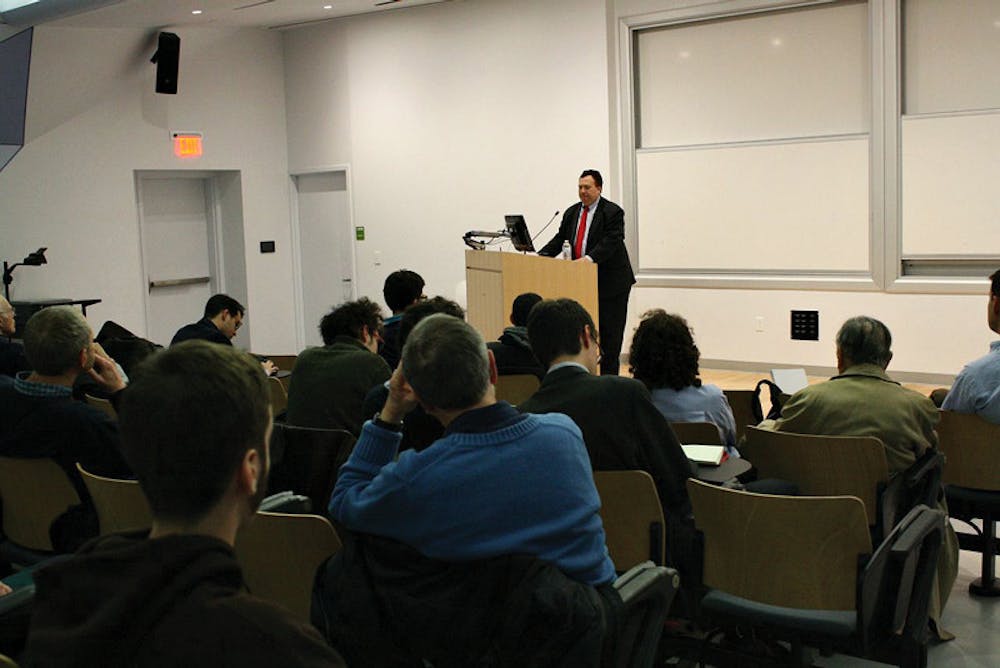With the Israeli-Palestinian conflict, “when you can’t solve everything, that doesn’t mean you solve nothing,” said David Makovsky, director of the Project on the Middle East Peace Process at the Washington Institute for Near East Policy, in a lecture Wednesday night. Makovsky served as an adviser to U.S. Secretary of State John Kerry P’02 as part of a team that worked on drawing up a peace agreement between Israelis and Palestinians from November 2013 to September 2014.
Makovsky spoke to a small crowd in the Building for Environmental Research and Teaching about his perspective on the negotiations surrounding the Israeli-Palestinian conflict. The team ultimately did not succeed this summer in its efforts to develop a formal peace agreement.
While the negotiations did not lead to a “satisfactory outcome,” Makovsky said, leaders of both sides have expressed support for a two-state solution. Though each side wanted a deal, they struggled to reach a satisfactory agreement because the “risk-averse” leaders participating in the discussions wanted “a deal on their own terms.”
Though the discussions were able to ease points of contention but “couldn’t close them” entirely, this wasn’t due to a lack of effort and creativity by the U.S. diplomats involved, Makovsky said. He described the discussions as a “high-definition effort by the United States” and an intense nine months.
Rather than being overly optimistic and hoping for a single immediate solution, Israelis and Palestinians should seek small improvements and “avoid deterioration,” Makovsky said, adding that “we shouldn’t make the perfect the alternative to the good.”
Makovsky took a hopeful tone, noting that in the time the Israeli-Palestinian conflict has lasted, the quality of life in Israel has risen significantly and the economy has improved as money has been spent more in areas such as education and less on the military. He concluded by urging audience members, “If you’re for dignity, if you’re for coexistence … you should hold your head high,” because “we need justice for both of these peoples.”
Yahel Murvitz Lahav ’17, who is from Israel, said it was “interesting to hear someone … who was actually there in the room where nobody could listen,” noting that the discussions Makovsky took part in were closed to the press. Murvitz Lahav added that he felt encouraged by Makovsky’s hopeful belief that progress was made in the discussions, since it seemed at the time that very little had been achieved.
Jason Ginsberg ’16, president of Brown Students for Israel and one of the event’s organizers, said the lecture was important because the Israeli-Palestinian conflict is not as prominent in the media now as it was during the summer, so people don’t “feel the importance of that issue.”
“These two parties are going to have to talk to each other to make any progress,” Ginsberg said, adding that Makovsky presented a unique perspective because “he has the experience of how that talking will lead to progress on the ground.”
The talk, entitled “Seeking Justice: Strengthening the Prospects for Middle East Peace,” was co-sponsored by Brown/RISD Hillel, Brown Students for Israel, J Street U Brown, the Watson Institute for International Studies, the International Relations Departmental Undergraduate Group and the Middle East Studies DUG. While the lecture was a stand-alone event, Brown Students for Israel and J Street U Brown — which both fall under the umbrella of Hillel — plan on bringing in several additional speakers throughout the year, Ginsberg said.

ADVERTISEMENT




